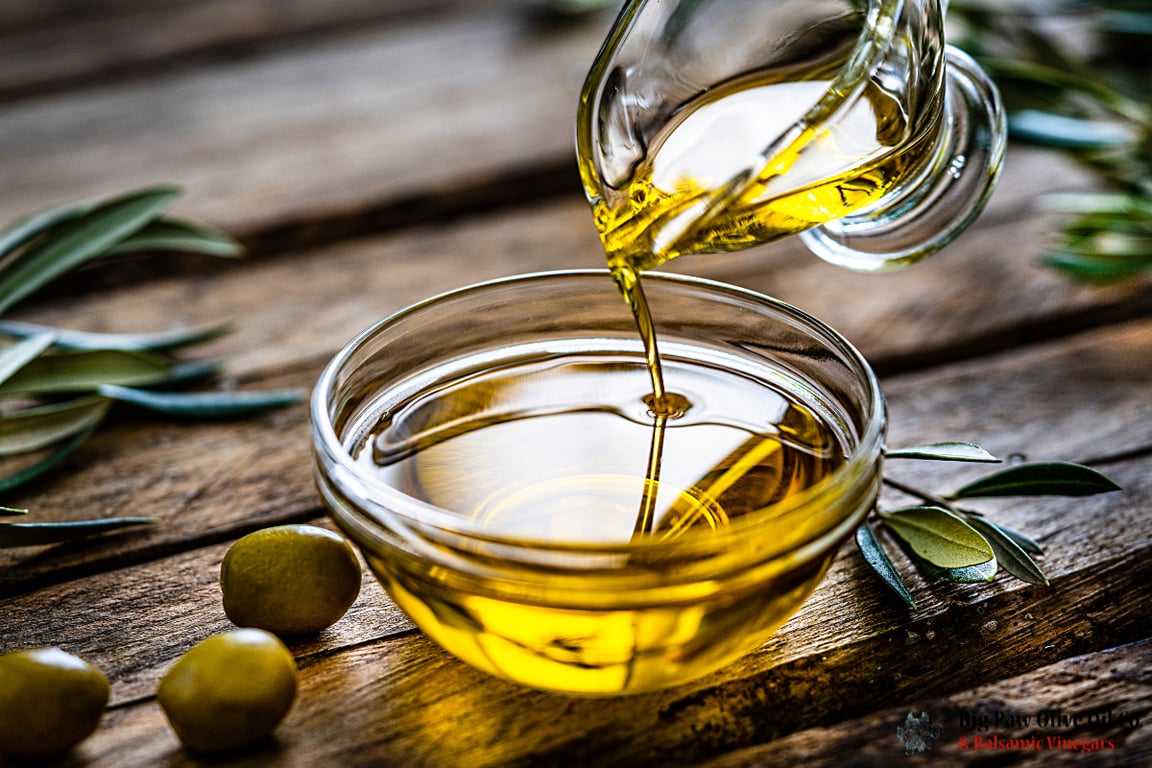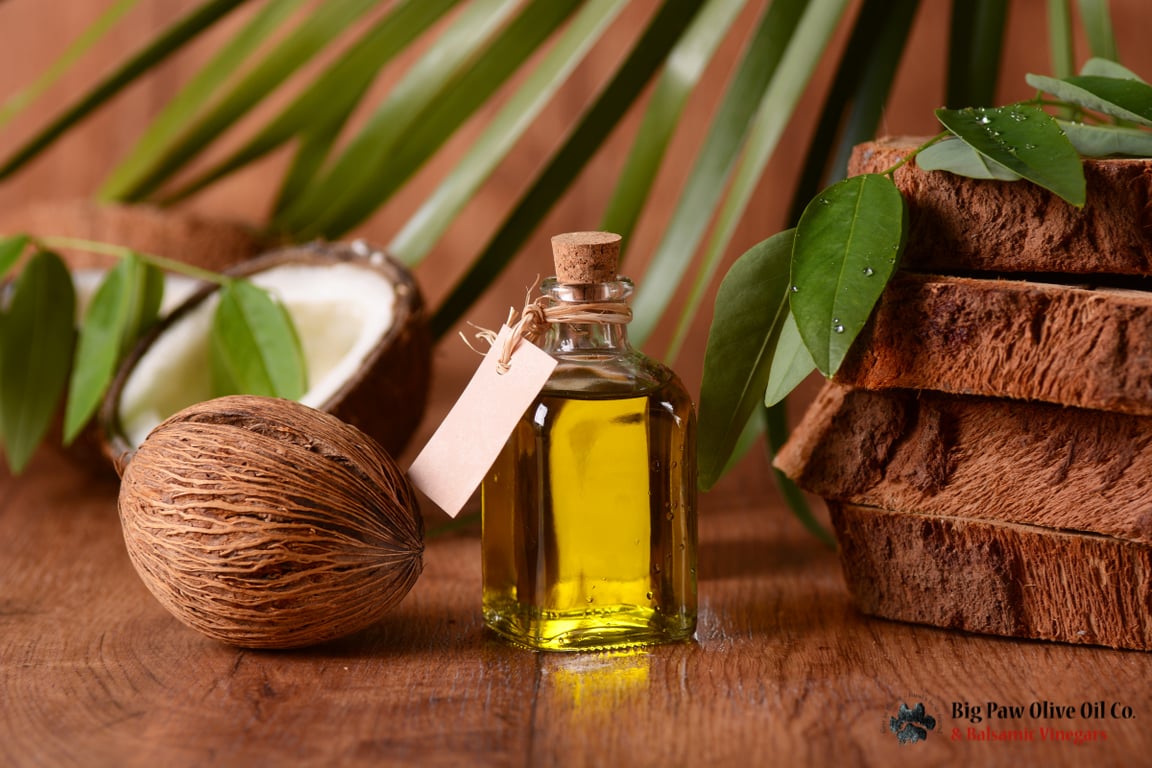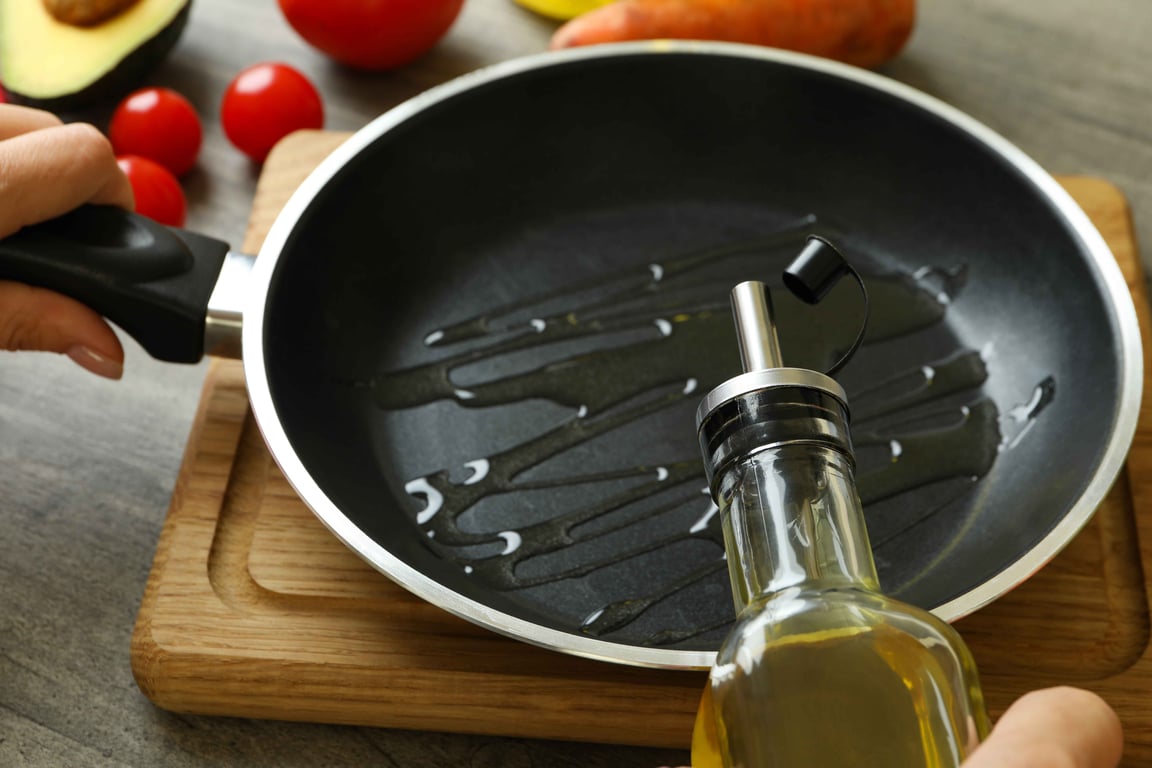Olive Oil vs Coconut Oil: Which Is Healthier and Better for Cooking

Both olive oil and coconut oil have earned a strong following for their flavor, versatility, and natural benefits. From cooking and baking to skincare and haircare, each has carved out its own reputation. But when you look beyond the hype, these oils have very different compositions and health impacts. This guide breaks down the facts, helping you understand the key differences between olive oil and coconut oil—and why extra virgin olive oil may be the better everyday choice for your kitchen and lifestyle.
TL;DR
- Olive oil is rich in monounsaturated fats and antioxidants that support heart and skin health.
- Coconut oil contains mostly saturated fat and should be used in moderation.
- For everyday cooking, skincare, and balanced nutrition, extra virgin olive oil is the superior choice.
What Is Olive Oil?
Olive oil is made by pressing whole olives, a fruit native to the Mediterranean region. The oil can be refined or unrefined depending on the extraction process and purity level. The purest form, extra virgin olive oil (EVOO), is cold-pressed without heat or chemicals, preserving the natural aroma, flavor, and antioxidants.
Big Paw’s Extra Virgin Olive Oil is crafted from high-quality olives and is rich in monounsaturated fats, polyphenols, and vitamin E. These nutrients support cardiovascular health, reduce inflammation, and promote overall wellness. Unlike coconut oil, olive oil stays liquid at room temperature, reflecting its higher ratio of healthy unsaturated fats.
What Is Coconut Oil?
Coconut oil is extracted from the white flesh of mature coconuts. Unlike most other plant oils, it is solid at room temperature due to its high concentration of saturated fat. The main fatty acid in coconut oil is lauric acid, a medium-chain triglyceride (MCT) known for its antimicrobial and antifungal properties.
There are two main types of coconut oil commonly available in the market:
- Virgin coconut oil: minimally processed, usually cold-pressed, and retains a light coconut aroma and taste.
- Refined coconut oil: processed to remove odor and flavor, creating a neutral oil more suitable for frying or recipes where coconut flavor is unwanted.
Coconut oil’s popularity surged during the rise of the keto and paleo diets, where it was marketed as a metabolism-boosting “super fat.” However, most nutrition experts advise moderation because roughly 85 to 90 percent of its fat content is saturated. A high intake of saturated fat may increase LDL (bad) cholesterol levels, potentially affecting long-term heart health.
Olive Oil vs Coconut Oil: Nutritional Comparison
| Nutrient (per 1 tbsp) | Extra Virgin Olive Oil | Coconut Oil |
| Calories | 120 kcal | 120 kcal |
| Total Fat | 14 g | 14 g |
| Saturated Fat | 2 g | 12 g |
| Monounsaturated Fat | 10 g | 1 g |
| Polyunsaturated Fat | 1 g | <0.5 g |
| Omega-3 Content | Moderate | Very low |
Although both oils have the same calorie count per tablespoon, the type of fat they contain makes a big difference. Olive oil is dominated by monounsaturated fats, which are known to reduce bad cholesterol and support heart health. Coconut oil, on the other hand, is almost entirely saturated, offering minimal omega-3 or polyunsaturated fatty acids. For people looking to maintain healthy cholesterol levels, olive oil is generally the more heart-friendly option.
Which Is Healthier: Coconut Oil or Olive Oil?
When comparing health benefits, most medical organizations, including the American Heart Association, recommend replacing saturated fats such as coconut oil with unsaturated fats found in olive oil.
Olive oil contributes to healthier cholesterol ratios, helps reduce oxidative stress, and supports blood vessel function. Its antioxidants, especially polyphenols, help protect cells from free radical damage and may reduce the risk of chronic diseases.
Coconut oil, though natural and plant-based, can increase both HDL (good) and LDL (bad) cholesterol. While the rise in HDL is beneficial, the accompanying increase in LDL can negate some of its potential advantages.
In short, if your goal is long-term heart health and balanced nutrition, olive oil is the healthier choice overall.
Cooking with Coconut Oil vs. Olive Oil
Coconut oil’s refined version has a higher smoke point, around 400°F, which makes it suitable for frying, sautéing, and baking. It adds a subtle sweetness that pairs well with desserts or tropical recipes. However, unrefined virgin coconut oil has a lower smoke point and is better for low-heat cooking.
Olive oil, especially high-quality Extra Virgin Olive Oil, is perfect for a wide variety of dishes. Its smoke point of around 375°F works well for roasting vegetables, pan-frying fish or chicken, or creating flavorful salad dressings. Unlike coconut oil, olive oil enhances the natural taste of ingredients without overpowering them.
Beyond performance, olive oil’s nutritional edge makes it the smarter everyday choice. Its healthy fats remain stable under heat, and its antioxidant compounds hold up well during cooking.
Can You Substitute Olive Oil for Coconut Oil in Cooking?
Yes, olive oil can easily replace coconut oil in most recipes using a one-to-one ratio. It works particularly well for sautéing vegetables, roasting meats, or dressing salads. If you’re baking, olive oil can be used instead of melted coconut oil in muffins, breads, or cakes, adding a subtle fruitiness.
Switching to olive oil is not only practical but also healthier, as it provides beneficial fats and antioxidants that coconut oil lacks. For anyone who wants to simplify their pantry, keeping a bottle of premium Extra Virgin Olive Oil covers nearly all culinary needs.
Olive Oil vs. Coconut Oil for Skin
Both oils are common in natural skincare, but they behave differently on the skin.
Coconut oil is thick and forms a protective barrier that helps retain moisture. It is excellent for very dry skin or as a nighttime treatment for rough areas like elbows and heels. However, it can clog pores for those prone to acne or sensitive skin.
Olive oil, by contrast, has a lighter texture and absorbs more easily. Its antioxidant profile helps neutralize environmental damage and keeps the skin soft without feeling greasy. Many people use it as a gentle cleanser, makeup remover, or body oil.
Pros and Cons of Coconut Oil
Pros
- Pleasant natural flavor for baking
- Antimicrobial and antifungal properties
- Effective as a moisturizer for very dry skin
Cons
- Extremely high in saturated fat
- Can raise LDL cholesterol
- Solid at room temperature, less versatile for quick recipes
Why Olive Oil Is the Better Everyday Choice
From a nutritional, culinary, and cosmetic perspective, olive oil consistently outperforms coconut oil. It offers a balanced fat profile, contributes to cardiovascular health, and enhances food naturally without overpowering flavor. It’s the foundation of the Mediterranean diet, one of the most researched and healthiest eating patterns in the world.
Coconut oil can still have a place in small amounts—especially for baking or specific skincare needs—but olive oil provides broader benefits across the board. Choosing a high-quality extra virgin variety like Big Paw Olive Oil ensures freshness, flavor, and the maximum amount of beneficial nutrients in every drop.
For a well-rounded, heart-healthy lifestyle, olive oil remains the clear winner.


 Fax : 1-973-799-0901
Fax : 1-973-799-0901 Call us now: +1 408-464-9048
Call us now: +1 408-464-9048





